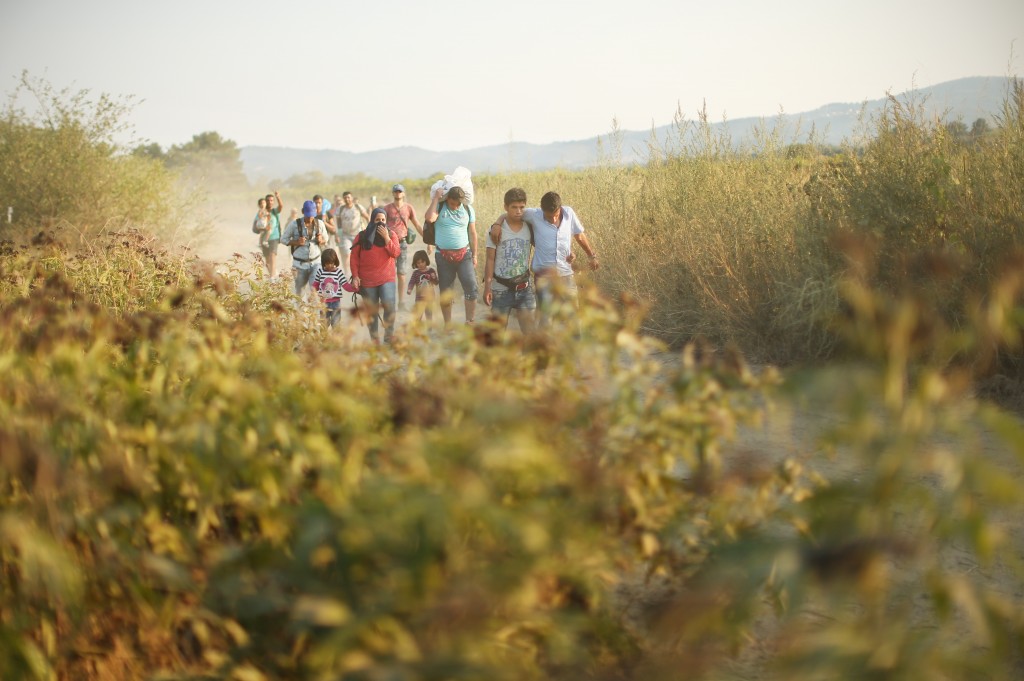How can refugees invade Europe without invaders?
By Khaled Diab
Any objective observer can see that the refugees of today are not the invaders of history. So why are so many Europeans afraid of refugees?

Photo: © Jure Eržen
Friday 9 October 2015
It has been wondrous to behold the massive outpouring of sympathy towards refugees in Europe. Every “refugees welcome” placard and act of solidarity has restored my faith a little in our human ability to do collective good. Those poignant acts of solidarity – from donations of meals and clothes to people offering their homes to those who have taken flight – which have shamed our leaders into action have been kindling to warm my heart during this winter of human misery.
But it strikes me that, as the mainstream has warmed to the refugees and their plight, the right has become more panicky and shrill, triggering the kind of fear and anxiety usually expressed by the defenceless towards ruthless conquerors.
Bedraggled, desperate and unarmed, the stream of refugees flowing into Europe can only be referred to as an army in the loosest, most figurative sense of the word. Yet, across Europe, conservatives have been singing, in chorus, the refrain “Islamic invasion”.
“They're not refugees. This is an invasion,” said Laszlo Kiss-Rigo, a bishop in southern Hungary, a country which has become a far-right hotbed in recent years and, stuck on a major transit route, has been building a wall to keep the refugees out.
What is most remarkable is that Bishop Kiss-Rigo's comments were a rebuke of his spiritual boss, Pope Francis I's commendable appeal to European churches to take in refugees.
Much further west, similar calls to man the barricades could also be heard. “It's an invasion that threatens our prosperity, our security, our culture and identity,” said Dutch far-right firebrand Geert Wilders, who once infamously called for the banning of the Quran.
When it comes to prosperity, the influx of refugees (equivalent to just 0.37% of the EU's population since 2012) poses little to no threat, economists and other experts agree. An analysis by the Brookings Institute reveals that the inflow of refugees actually has a net positive effect on host economies – and the OECD agrees.
If the European economy stands to benefit from the influx of refugees, why all the panic?
One reason is economic anxiety. Across Europe job insecurity has risen dramatically while youth unemployment in many countries is perilously high. In addition, the corrosion of the welfare state and severe austerity measures have left millions reeling in shock.
Rather than attribute Europe's economic ills on the continent's growing welfare state for the wealthy, the corporations exporting (or “outsourcing”) jobs for greater profit and financial sector mismanagement, far-right demagogues find it easier to blame the weak, and kick those who are already down. In addition, the periphery countries dealing with the brunt of the crisis are the poorest and least-equipped to do so.
Beyond economics, many Europeans are genuinely concerned about the potential danger to their security posed by refugees. While it seems far-fetched and even preposterous to people like me that those fleeing the combined terror of the Assad regime and ISIS will themselves turn to terrorism, many ordinary Europeans do not possess the luxury of that insight.
In addition, there is the slim chance that ISIS will play on these fears and send a handful of terrorists amid the flow of genuine refugees. In such an instance, all it need take is a single act of calculated terror to cause Fortress Europe to pull up the drawbridges it has recently slightly let down.
However, fears about security are subordinate to anxieties about culture and identity. Since World War II, Western Europe has witnessed a remarkable demographic transformation in which citizens from former colonies – and from Turkey, in the case of Germany – and their offspring now constitute a significant minority of the population.
Though many have related to this new multicultural reality as enriching and empowering, others have found it troublesome and threatening, particularly those who feel their culture is superior to those of the immigrants. When coupled with the corrosive effects of globalisation and rapid technological development, as well as the rapid demise of religion in many parts of Europe in recent decades, many feel adrift in an uncharted ocean.
Although fanatics capture the headlines and people's imaginations, this death of religion has also been occurring among what Europe identifies as its Muslim minority, which was never defined so monolithically in the past. For example more than a fifth of “Muslims” in France don't believe in Islam nor practise it.
One reason why anxiety towards Muslims carries an extra punch compared to other groups, such as Indians and Chinese, is the centuries-old mutual rivalry between neighbouring Islam and Christendom (nowadays referred to as the West).
Just as the crusades continue to cast a shadow over the Middle East, Islamic expansionism in the early centuries of Islam have left their mark on European identity, both negatively and positively.
This partly explains why an older Spanish gentleman told a friend of mine: “There is more than one way to re-conquer Spain.” This is despite the fact that it has been half a millennium since Spain completed its Reconquista and expelled the last Muslim king in Andalusia, Muhammad XII of Granada.
This Muslim menace is shrouded in the mists of time and subsequent might for the powerful former empires of western Europe, which partly explains why they have been able to absorb large Muslim populations. However, this is less the case in some parts of central and southeastern Europe, where the Ottomans dominated until relatively recently, and whose independence was won at a huge cost. But this should be something that unites them with the Syrians who, like many eastern and southern Europeans, were victims of the Ottoman empire too, especially once it shed its multicultural tolerance.
Remembered history, along with the resurgence of religiosity and its negligible Muslim minority, might help explain why Slovakia wished only to take in Christian Syrian refugees. After all, what is today Slovakia was a frontline in the constant wars between the Ottoman and the Habsburg empires, though Slovakia, except for a small sliver in the south, was never actually ruled by the Turks.
Populists and demagogues have been riding, and fanning, the wave of re-Christianisation and growing Islamophobia by playing the history card relentlessly. “When it comes to living together with Muslim communities, we are the only ones who have experience because we had the possibility to go through that experience for 150 years,” said Viktor Orban, Hungary's far-right “Viktator”, evoking memories of the Ottoman carve-up of the medieval Kingdom of Hungary which empowered the peasantry but destroyed the ruling class.
This is a far cry from the earlier pronouncements by Orban, who is an atheist who now regularly talks about “Christian values”, that “Turkey is not a state at the edge of Europe anymore.” What Orban's swinging rhetorical pendulum underlines is that there is no “clash of civilisations”, just clashes of interests and convenience.
Moreover, any sensible observer should be able to see clearly that the refugees of today are not the invaders of history. In our interconnected world, people need to conquer their fears and let sensibility and humanity reign.
____
Follow Khaled Diab on Twitter.
This is the extended version of an article which first appeared on Al Jazeera on 1 October 2015.


More debate is available at https://www.facebook.com/aljazeera/posts/10153767027353690